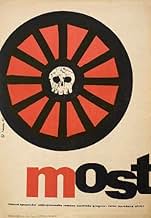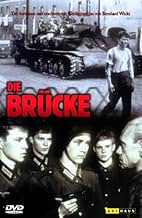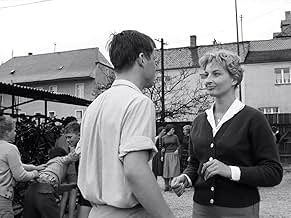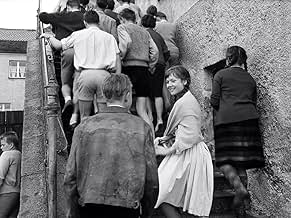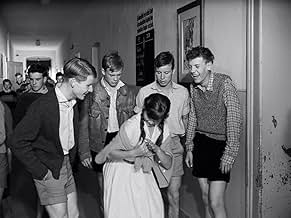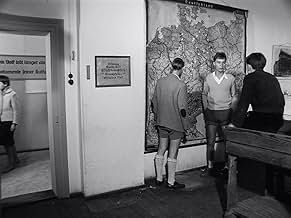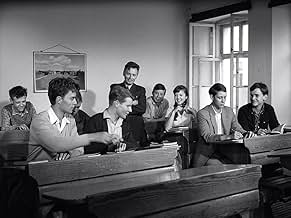VALUTAZIONE IMDb
7,9/10
9083
LA TUA VALUTAZIONE
La Germania è oramai irrimedialmente sconfitta. Hitler chiama alle armi anche i quattordicenni. Alcuni ragazzi si attestano su un ponte, decisi a sbarrare il passo agli americani che stanno ... Leggi tuttoLa Germania è oramai irrimedialmente sconfitta. Hitler chiama alle armi anche i quattordicenni. Alcuni ragazzi si attestano su un ponte, decisi a sbarrare il passo agli americani che stanno sopraggiungendo.La Germania è oramai irrimedialmente sconfitta. Hitler chiama alle armi anche i quattordicenni. Alcuni ragazzi si attestano su un ponte, decisi a sbarrare il passo agli americani che stanno sopraggiungendo.
- Regia
- Sceneggiatura
- Star
- Candidato a 1 Oscar
- 16 vittorie e 1 candidatura in totale
Volker Bohnet
- Hans Scholten
- (as Folker Bohnet)
Günter Hoffmann
- Sigi Bernhard
- (as Günther Hoffmann)
Recensioni in evidenza
When I saw in news accounts the lovely yet fearful face of a 16 year-old, who had defected from the Taliban during the campaign against terrorists in Afghanistan, in the aftermath of the 9/11, I was taken back to Bernhard Wicki's Die Brücke (The Bridge), to the faces of young German boys who were recruited by the Nazis to defend a "last" bridgehead, in the final days of World War II in Europe. In both cases, young "true believers" were used as cannon fodder by cynical adults in their futile power games, which they had disguised as moral crusades.
A tiny band of boys, holding weapons as big as they, their bodies and faces still soft and fresh and tight, facing the juggernaut of tanks and artillery and machine guns which we know will soon tear them to pieces. And for what? An ideal?
I suspect that The Bridge was the basis for the Timothy Hutton, Sean Penn vehicle, "Taps". However, The Bridge is the starker and more brutal treatment because, unlike the what-if story of Taps, the what-if does not apply to The Bridge. In fact, throughout history, the use of children in furtherance of warfare has a sickening frequency, the earliest I know of being the Children's Crusade, and now we have the Tamil Tigers (little girls with lockets of cyanide vials) and Palestinian boy bombs.
The Bridge deserves to be revived and shown to as wide an audience as possible in this Dastardly New World we live in.
A tiny band of boys, holding weapons as big as they, their bodies and faces still soft and fresh and tight, facing the juggernaut of tanks and artillery and machine guns which we know will soon tear them to pieces. And for what? An ideal?
I suspect that The Bridge was the basis for the Timothy Hutton, Sean Penn vehicle, "Taps". However, The Bridge is the starker and more brutal treatment because, unlike the what-if story of Taps, the what-if does not apply to The Bridge. In fact, throughout history, the use of children in furtherance of warfare has a sickening frequency, the earliest I know of being the Children's Crusade, and now we have the Tamil Tigers (little girls with lockets of cyanide vials) and Palestinian boy bombs.
The Bridge deserves to be revived and shown to as wide an audience as possible in this Dastardly New World we live in.
German war drama from Deutsche Film Hansa and director Bernhard Wicki. In the waning days of WW2, a group of German high school friends all get drafted into the army, much to their excitement. However, with literally only a single day's worth of training, they are sent to their hometown to guard a small bridge until it can be destroyed by a demolition crew. The young men take their task very seriously, leading to tragic results
The 100 minutes film spends the first hour establishing the characters of each of the young men, so that the frenetic last act becomes even more devastating, as these are fully fleshed out individuals instead of the too-frequent ciphers and cliches found in many war films. The tone is distinctly anti-war, but the movie is never preachy, and the futility of their actions is made apparent naturally, without contrivance. The filmmaking in the final stretch of the film is ahead of its time in the use of rapid edits, traveling camera shots, and zooms. The movie was nominated for the Best Foreign Language Film Oscar (it lost to Black Orpheus). Recommended.
The 100 minutes film spends the first hour establishing the characters of each of the young men, so that the frenetic last act becomes even more devastating, as these are fully fleshed out individuals instead of the too-frequent ciphers and cliches found in many war films. The tone is distinctly anti-war, but the movie is never preachy, and the futility of their actions is made apparent naturally, without contrivance. The filmmaking in the final stretch of the film is ahead of its time in the use of rapid edits, traveling camera shots, and zooms. The movie was nominated for the Best Foreign Language Film Oscar (it lost to Black Orpheus). Recommended.
Die Brücke was on Dutch or Belgian TV some 20 years ago, when I saw it. Like many others I was deeply impressed. There has been criticism on acting and directing. This criticism is correct. But it does not matter. What counts is the script. Only seldom I have seen a movie with a better script. Here a modified quote from The Good, the Bad and the Ugly applies: never seen wasted young lives so badly. With a fairly simple story Die Brücke makes mercilessly clear what war and National-Socialism is. I can understand, why nobody has the courage to do a remake. Perfection might lead to a lesser impact in this case. One can argue, that Paths of Glory and Hamburger Hill are better. Not a bad word about these two, but Die Brücke is emotionally the most gripping.
I lived through that time, I was seventeen, and I know fourteen year olds were fighting to the last " boy ". The realism of this film still takes me back to '45. It happened that way.
We were shown this movie at school, so I always remembered it as a politically correct piece educational film - which it is, in a way. This is film with a clear purpose. It wants you to learn something. The amazing thing is that it is also a good film. Its message "War Is Bad" is brought across not so much by showing blood, death and destruction but by the means of classical tragedy: There are no "bad guys" in this film; on the contrary, most people try to do good, be humane. (E.g. the boys are told to guard the bridge in order to keep them away from the front.) But what they do results in disaster, because the evil is war itself.
Lo sapevi?
- QuizThe end credits suggest that the story relates to true events which supposedly happened on "April 27, 1945", but this specific story is fictitious, while the general use of teenage boys as soldiers in the last days of the Third Reich is accurate.
- BlooperWhen the boys are assembled at night, they are told they will be part of the 336th Division. That unit was destroyed and surrendered to the Soviets on the Eastern Front nearly a year earlier in 1944 and was never reformed.
- Citazioni
Sigi Bernhard: Whoever defends one square foot of German soil defends Germany!
- Versioni alternativeAn English dubbed version was released in the USA in 1963.
- ConnessioniEdited into Bernhard Victor Christoph Carl von Bülow genannt Loriot (2008)
I più visti
Accedi per valutare e creare un elenco di titoli salvati per ottenere consigli personalizzati
Dettagli
- Tempo di esecuzione
- 1h 43min(103 min)
- Colore
- Mix di suoni
Contribuisci a questa pagina
Suggerisci una modifica o aggiungi i contenuti mancanti

